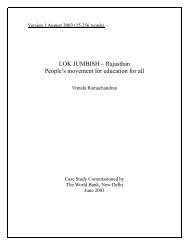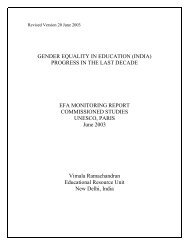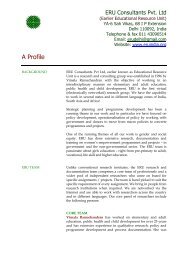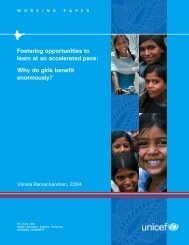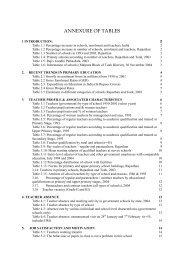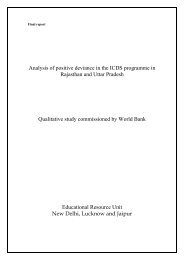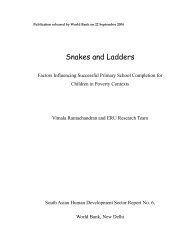primary school teachers the twists and turns of everyday practice
primary school teachers the twists and turns of everyday practice
primary school teachers the twists and turns of everyday practice
Create successful ePaper yourself
Turn your PDF publications into a flip-book with our unique Google optimized e-Paper software.
Version 20 Oct 08, edited final<br />
written about for over 20 years <strong>and</strong> <strong>the</strong> predominant training regime has received<br />
widespread attention <strong>and</strong> criticism.<br />
• In all states, in-service training continues to utilise <strong>the</strong> ‘cascade model’, despite<br />
attendant transmission loss at each successive level <strong>of</strong> training;<br />
• Training packages continue to be designed at upper levels <strong>of</strong> <strong>the</strong> educational<br />
hierarchy by functionaries with little or no personal experience <strong>of</strong> teaching at <strong>the</strong><br />
elementary level; while DIETs <strong>and</strong> o<strong>the</strong>r in-service training institutions serve<br />
merely as implementing agencies;<br />
• Training programmes are poorly designed, implemented in an ad hoc manner<br />
<strong>and</strong> bear no relation to <strong>teachers</strong>’ real needs with respect to content or<br />
instructional strategies;<br />
• No follow-up is conducted to evaluate <strong>the</strong> effectiveness or relevance <strong>of</strong> training<br />
content to <strong>teachers</strong>’ <strong>practice</strong>; <strong>and</strong><br />
• The pedagogical underpinnings <strong>of</strong> <strong>the</strong>se training programmes tend to be highly<br />
superficial <strong>and</strong> poorly understood even by <strong>the</strong> trainers <strong>the</strong>mselves.<br />
(Alex<strong>and</strong>er 2008; Dhankar 2002 ; Dyer 1996; Dyer <strong>and</strong> Choksi 2004; Sarangapani <strong>and</strong><br />
Vasavi 2003)<br />
The implications <strong>of</strong> <strong>the</strong> foregoing for <strong>the</strong> promotion <strong>of</strong> meaningful learning<br />
experiences for <strong>teachers</strong>, not to mention children in <strong>the</strong> classroom, are obvious. To<br />
cite one example:<br />
Clarke (2000) found that although DPEP <strong>teachers</strong> had learnt <strong>the</strong> new jargon (‘activity-based’,<br />
‘child-centred’, joyful learning’, etc.) <strong>the</strong>re was no appreciable difference in <strong>the</strong> underst<strong>and</strong>ing or<br />
<strong>practice</strong> <strong>of</strong> DPEP <strong>and</strong> non-DPEP <strong>teachers</strong>. Both methods were reported to be derived from preexisting<br />
pedagogical <strong>practice</strong>s <strong>and</strong> had no evidence <strong>of</strong> special child-centred focus. Several<br />
educationists have pointed to <strong>the</strong> inadequacy <strong>of</strong> <strong>the</strong> notion <strong>of</strong> ‘quality’ that has informed <strong>the</strong> DPEP<br />
arguing that it relies too heavily on only a intuitive notion <strong>of</strong> <strong>the</strong> underst<strong>and</strong>ing <strong>of</strong> <strong>the</strong> child as <strong>the</strong><br />
starting point, for curriculum reform (Dhankar 2002). (…) Many <strong>teachers</strong> <strong>and</strong> observers have<br />
indicated <strong>and</strong> as we have observed in several <strong>school</strong>s, ‘joyful learning’ <strong>and</strong> teaching have become<br />
synonymous with making children sing <strong>and</strong> dance in class (Sarangapani <strong>and</strong> Vasavi 2003).<br />
The issue <strong>of</strong> relevance is an inevitable by-product <strong>of</strong> how training programmes are<br />
designed in India: by high level functionaries with little knowledge or experience <strong>of</strong><br />
teaching conditions in <strong>primary</strong> <strong>school</strong>s; based on an idealised vision <strong>of</strong> what <strong>teachers</strong><br />
‘should’ do, but with scant attention to practical details <strong>of</strong> hurdles in<br />
implementation; with limited input from <strong>teachers</strong> <strong>the</strong>mselves <strong>and</strong> no space within<br />
<strong>the</strong> training for questioning or analysis <strong>of</strong> content. To take an example from Gujarat:<br />
Teachers felt that <strong>the</strong>ir trainers were not sufficiently aware <strong>of</strong> <strong>the</strong> realities <strong>of</strong> small <strong>school</strong>s with<br />
single rooms <strong>and</strong> no facilities, <strong>and</strong> hence did not <strong>of</strong>fer strategies for working in such conditions.<br />
(…) The pedagogical problems <strong>of</strong> <strong>the</strong> <strong>teachers</strong> in Gujarat’s rural <strong>school</strong>s are not primarily related<br />
to infrastructure, but to <strong>the</strong> absence <strong>of</strong> skills to cope with ei<strong>the</strong>r teaching several classes<br />
simultaneously, or <strong>the</strong> needs <strong>of</strong> first generation learners, compounded by heavy <strong>and</strong> <strong>of</strong>ten<br />
irrelevant curriculum. The type <strong>of</strong> pre-service training <strong>the</strong>y receive does not equip <strong>the</strong>m with<br />
adequate classroom management strategies, or <strong>the</strong> confidence to adapt <strong>the</strong> curriculum, <strong>and</strong> is an<br />
important factor in low teacher motivation (Dyer 1996).<br />
Evaluations <strong>and</strong> reviews have <strong>of</strong>ten recommended that <strong>the</strong> government should do<br />
things differently—a recent one summarises <strong>the</strong> suggestions that have been made<br />
from within <strong>the</strong> system <strong>and</strong> by donor agencies that are financing <strong>the</strong> SSA<br />
programme.<br />
58




